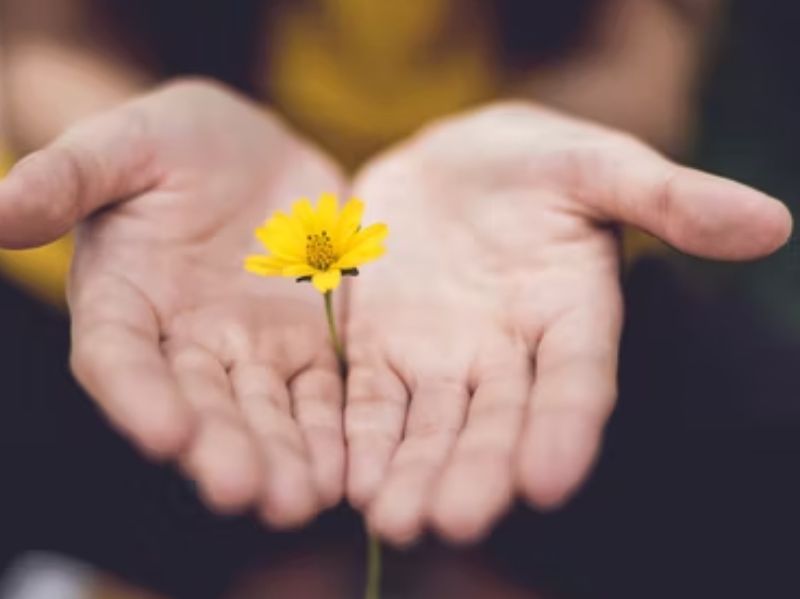Gratitude is an incredibly positive and powerful emotion. It helps us to shift our focus and gain a sense of appreciation in life. Gratitude allows us to see the goodness in the world around us. And in doing that, it can help lead us down a more rewarding and happier path.
It isn’t always easy to express gratitude. We are continually presented with others’ lives which can lead us to make comparisons on what we have. Being grateful also goes against our human need to control areas of our life instead of just having acceptance for what it is. But taking the time to have more gratitude can create such a positive impact on our mental well-being and health.
This article will look at the meaning of gratitude, the benefits of being more grateful, how our levels of gratitude change over time, and some tips to help you be more grateful in life.
Contents
What does being grateful mean?
One definition of gratitude is that it is ‘…a strong feeling of appreciation to someone or something for what the person has done to help you’.
Professor Robert Emmons who has led extensive research within the field of gratitude goes a bit deeper into the definition. He says that gratitude is made up of two components.
- We can confirm that there are good things in life, and we have received them.
- We can recognize that these good things come from different sources outside of our own actions.
This interesting study discusses how gratitude plays a distinctive role in our emotional experiences. And that it differs from other positive traits such as optimism because it involves noticing positive experiences and outcomes (while optimism is directed towards expecting positive experiences and outcomes).
Being grateful also means we are:
- Being thankful.
- Showing kindness (to ourselves or others).
- Focusing our attention on what we appreciate in life.
- Having a positive mindset.
- Being present.
- Paying attention to our emotions.
It is another unique and evolutionary skill we have acquired as humans and is very much a social emotion, which helps us to build robust relationships.
Could you imagine if we as humans didn’t have the ability to show this emotion? I doubt that we would ever want to do things for each other again!
What are the benefits of being grateful?
Whether we are expressing gratitude towards ourselves or to others, being grateful brings many advantages and opportunities to explore a different way of thinking.
To start, gratitude has been found in several studies to be associated with greater happiness. It has also been linked to better well-being and greater life satisfaction.
Being grateful also helps to:
- Strengthen relationships with others.
- Feel more positive.
- Improve our physical health.
- Deal with demanding situations better.
- Lower stress, depression, and anxiety.
- Improve the quality of sleep.
Improving our levels of gratitude can clearly provide us with a host of benefits to our physical health, emotional wellbeing, and relationships. So, it seems well worth investing in this powerful, social emotion.
Do our levels of gratitude change over time?
This recent study found that gratitude does change across the life span, with older adults being found to have the greatest gratitude compared with younger people and middle-aged adults.
Professor Robert Emmons claims there is a trend towards greater emotional positivity with age. The reason behind this is as we get older, the brain becomes less active when presented with negative information. And at the same time, individuals increase their reactivity in response to positive information.
Despite these findings, some studies have found that gratitude does not change over time. Although, this research does suggest (like many other studies), that there are many developmental influences that affect an individual’s level of gratitude in life.
Some examples of developmental influences could be:
- Peer relationships.
- Hereditary or genetic predispositions.
- Parental attitudes.
What seems to be apparent here is there is no obvious answer as to whether gratitude changes over time, but clearly developmental and environmental factors play a huge role in our ability to be grateful.
It may be that having an awareness of potential influences in our life might be useful in our quest for gratitude.
I have personally found being more grateful comes with age. And I think part of that comes from living through different experiences and being able to reflect on situations in life.
I wonder if you have found your levels of gratitude changing as you’ve got older?
5 ways to be more grateful in life
Whether you want to learn how to be more grateful to others or show some more gratitude in your own life (or both!), feel free to check out some of these ideas.
1. Keep a gratitude journal
At first, it can feel quite difficult to suddenly conjure up all the things you are grateful for.
A good way of getting your thoughts down is by keeping a gratitude journal. Every day, try and write down 5 different things you are grateful for.
Remember these can be the smallest of things (the bus wasn’t late today!) or something on a much bigger scale.
Take time to reflect at the end of each day and think of a situation or experience you are grateful for. It may even surprise you what you write down.
2. Change to a more positive way of thinking
Changing our mindset to a more positive one is a valuable first step. Instead of thinking about what you haven’t got in life, focus on what you have got.
I often catch myself doing this when I am in a particularly bad mood. But now that I recognize this, I actively change my way of thinking to make it more positive. It really helps you to feel more grateful too!
Here’s one of our articles about how to change your perspective that will help you focus on the positive more.
3. Practise mindfulness or meditation
Practicing mindfulness and meditation means we are being fully in the present. And when we do this, it means we are not looking for something in the future or the past. It means that we’re just being grateful for where you are now.
It is an immensely powerful exercise and one which is highly recommended. If you want to learn more, here’s a starter on mindfulness and why it’s so important!
4. Appreciate others more
It is all too easy to wrap ourselves up in our own lives. But when we become more aware of other people and their needs and experiences, it can make us feel more grateful for our life and what we have been given.
When someone shows gratitude to me it feels amazing, and I instantly feel happy. So, let’s return the favor to someone else.
Make positive comments to your family and friends around you and show your appreciation more for things people have done for you.
Sometimes we can take those closest to us for granted. If you want to change that, here’s an article about how to be more appreciative of others.
If you are tempted to announce on social media something negative or to complain about something, think about using social media to communicate your gratitude.
Stop yourself from expressing something negative, and instead post about something that you are thankful for.
We wrote an article about how to use social media positively, which comes with a lot more benefits to your mental health besides gratitude!
💡 By the way: If you want to start feeling better and more productive, I’ve condensed the information of 100’s of our articles into a 10-step mental health cheat sheet here. 👇
This Cheat Sheet Will Help You Be Happier and More Productive
Thrive under stress and crush your goals with these 10 unique tips for your mental health.
Wrapping up
Gratitude is a valuable and essential emotion that fosters our social interactions with others. Not only does it improve our relationships when we are more grateful, but we can enjoy better physical health, life satisfaction, and happiness.
Your levels of gratitude may change over time or even fluctuate depending on your personal circumstances. But making gratitude a priority in your life and bringing yourself back to that is so important. It is all too easy to focus on what we haven’t got in life, but by simply changing this mindset we can develop a much more positive way of thinking. It can influence and transform our outlook in life for the better, helping us to lead happier and more contented lives.


